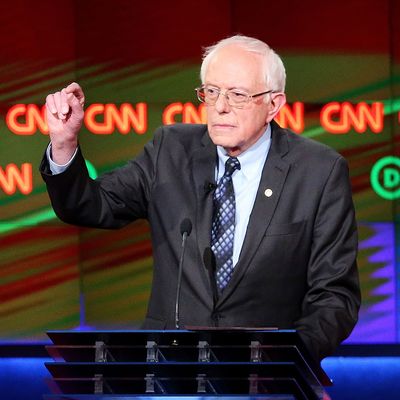
There have been three Republican debates since the last time Hillary Clinton and Bernie Sanders faced off, and after watching those raucous affairs, seeing candidates delve deep into policy differences on Sunday night was almost confusing. Each Democratic forum has been increasingly heated, and the rhetoric from both candidates was noticeably sharper at the CNN debate, with Clinton once again attacking Sanders on backing immunity for gun manufacturers, and the Vermont senator going after her for her Wall Street ties and trade deals. But even their testiest exchange — in which Sanders stopped Clinton from interrupting him by saying, “Excuse me, I’m talking” — was a far cry from watching candidates concoct insulting names for each other on the debate state. Here are the highlights.
Flint Water Crisis Gets the Spotlight
During last week’s GOP debate in Michigan, there was one question about the poisoned water in Flint, and Marco Rubio responded by defending how Republican governor Rick Snyder handled the issue, which he said had become too politicized.
Therefore, it was quite the contrast to see about a quarter of the Democratic debate, which was held in Flint, devoted to the crisis. For the most part, Clinton and Sanders agreed that the situation represented a horrific failure of the government at multiple levels. Both said EPA officials who failed to act should be held accountable, and for the first time, Clinton called for Governor Snyder’s resignation. (Sanders has been saying he should step down since January.) Snyder registered his strong disagreement in tweets posted during the debate.
Clinton and Sanders Battle Over Bailouts
Following the lengthy section on the water crisis, the topic turned to another huge issue in Flint: the auto industry. “We had the best year that the auto industry had in a long time. I voted to save the auto industry,” Clinton said, referring to the 2009 bailout. “He voted against the money that ended up saving the auto industry. I think that is a pretty big difference.”
Sanders countered that what she was referring to amounted to a “Wall Street bailout.” (Clinton tried to protest, but he wouldn’t let her cut him off.) “When billionaires on Wall Street destroyed this economy, they went to Congress and they said, ‘please, we’ll be good boys, bail us out.’ You know what I said? I said, ‘let the billionaires themselves bail out Wall Street.’ It shouldn’t be the middle class of this country.”
As the Detroit Free Press explains, the $82 billion auto bailout was part of the larger Troubled Asset Relief Program (TARP) that bailed out the big banks — thus, “a senator or congressman could not vote to rescue GM and Chrysler without voting to provide the money to keep the nation’s largest investment banks from failing.”
Sanders Questioned on Sandy Hook Suit
Gun control is one of the few issues where Clinton is to the left of Sanders, and they’ve sparred many times about his 2005 vote to shield gun manufacturers from liability in lawsuits over gun violence. Following a question from the father of a girl who nearly died in the recent Kalamazoo shooting, Clinton brought up the victims of Sandy Hook (which some found moving and others found exploitative), and Anderson Cooper noted that the legislation may derail the Newtown families’ effort to sue Remington.
“If you go to a gun store and you legally purchase a gun and then three days later you go out and you start killing people, is the point of this lawsuit to hold the gun shop owner or the manufacturer of that gun liable?” Sanders responded. “If that is the point I have to tell you I have to disagree.”
Candidates Explain How They’re “A Little Bit Racist”
The award for most unexpected reference of the night went to CNN’s Don Lemon, who pressed the candidates to address their “racial blind spots” by quoting Avenue Q — or rather FBI director James Comey, who cited the musical in a speech last month.
Sanders and Clinton Asked to Get Personal — Maybe Too Personal — on Religion
Once again, Sanders was pressed to get more specific about his faith, when a woman asked if he believes “God is relevant.” (The same woman asked Clinton, “To whom and for whom do you pray?” She answered, rather than saying “that’s private.”)
He gave a vague endorsement of the Golden Rule, but said being Jewish is an important part of his identity, offering this example: “Look, my father’s family was wiped out by Hitler in the Holocaust. I know about what crazy and radical and extremist politics mean. I learned that lesson as a tiny, tiny child when my mother would take me shopping, and we would see people working in stores who had numbers on their arms because they were in Hitler’s concentration camp.”
Everybody Wants to Take on Trump
There was only one reference to a candidate’s appendage, and it was totally G-rated. When asked about the prospect of facing Donald Trump in a general election Sanders responded, “I’ll tell you something, this is my right arm. I’m prepared to give … ” then he cut himself off, saying, “no, I shouldn’t say that. I would love to run against Donald Trump, and I’ll tell you why.”






























